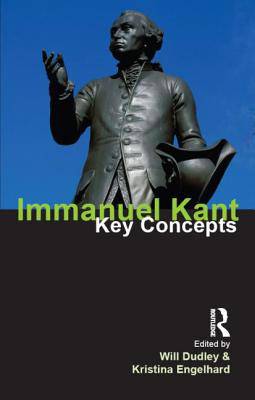
Door een staking bij bpost kan je online bestelling op dit moment iets langer onderweg zijn dan voorzien. Dringend iets nodig? Onze winkels ontvangen jou met open armen!
- Afhalen na 1 uur in een winkel met voorraad
- Gratis thuislevering in België vanaf € 30
- Ruim aanbod met 7 miljoen producten
Door een staking bij bpost kan je online bestelling op dit moment iets langer onderweg zijn dan voorzien. Dringend iets nodig? Onze winkels ontvangen jou met open armen!
- Afhalen na 1 uur in een winkel met voorraad
- Gratis thuislevering in België vanaf € 30
- Ruim aanbod met 7 miljoen producten
Zoeken
€ 79,45
+ 158 punten
Uitvoering
Omschrijving
Immanuel Kant is among the most pivotal thinkers in the history of philosophy. His transcendental idealism claims to overcome the skepticism of David Hume, resolve the impasse between empiricism and rationalism, and establish the reality of human freedom and moral agency. A thorough understanding of Kant is indispensable to any philosopher today. The significance of Kant's thought is matched by its complexity. His revolutionary ideas are systematically interconnected and he presents them using a forbidding technical vocabulary. A careful investigation of the key concepts that structure Kant's work is essential to the comprehension of his philosophical project. This book provides an accessible introduction to Kant by explaining each of the key concepts of his philosophy. The book is organized into three parts, which correspond to the main areas of Kant's transcendental idealism: Theoretical Philosophy; Practical Philosophy; and, Aesthetics, Teleology, and Religion. Each chapter presents an overview of a particular topic, while the whole provides a clear and comprehensive account of Kant's philosophical system.
Specificaties
Betrokkenen
- Auteur(s):
- Uitgeverij:
Inhoud
- Aantal bladzijden:
- 276
- Taal:
- Engels
- Reeks:
Eigenschappen
- Productcode (EAN):
- 9781844652396
- Verschijningsdatum:
- 25/11/2010
- Uitvoering:
- Paperback
- Formaat:
- Trade paperback (VS)
- Afmetingen:
- 140 mm x 211 mm
- Gewicht:
- 317 g

Alleen bij Standaard Boekhandel
+ 158 punten op je klantenkaart van Standaard Boekhandel
Beoordelingen
We publiceren alleen reviews die voldoen aan de voorwaarden voor reviews. Bekijk onze voorwaarden voor reviews.











